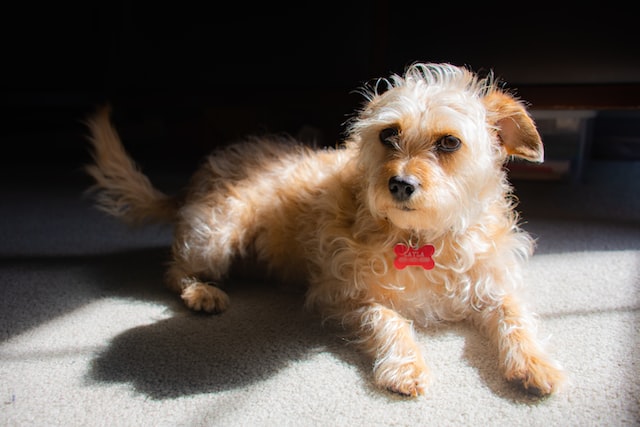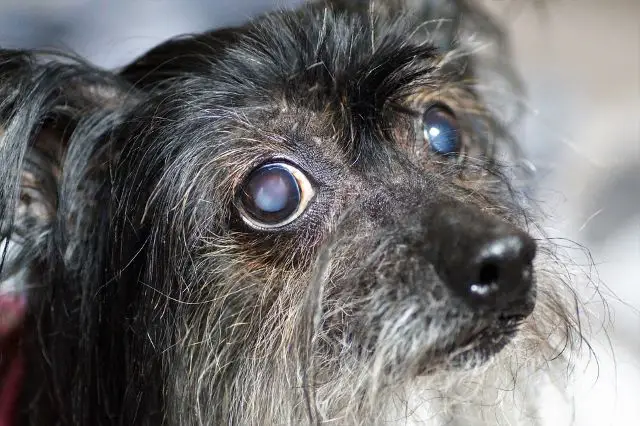The Yorkiepoo is one of the smallest breeds of Doodles. Although these little dogs have a long lifespan, they also have their fair share of health problems. So what health problems can you expect with your little Yorkiepoo? Read on to find out.

Yorkiepoos are relatively healthy dogs, but here are some health problems they could develop:
- Epilepsy
- Cushing’s Disease
- Hypothyroidism
- Legg-Calve-Perthes Disease
- Pancreatitis
- Bladder Stones
- Portosystemic Shunt (PSS)
- Atopic Dermatitis
- Patellar Luxation
- Periodontal Disease
While achieving both the desirable traits of the Yorkshire Terrier and Poodle, it’s still very likely your Yorkiepoo could develop some health problems. So let’s look at the possible hereditary and acquired health problems of the Yorkiepoo.
Hereditary Yorkiepoo Health Problems
Yorkiepoo hereditary health problems are diseases passed down through the parent breed’s genetics. Usually, these are unpreventable and quite unpredictable, but you can ask for a thorough health history of your Yorkiepoos parents to see if any hereditary diseases are possible.
Epilepsy
The first of the hereditary health problems we’ll look at is Epilepsy. This condition is a prevalent neurological disorder in dogs. It results from an abnormality in the brain; the cause could be hereditary. With Epilepsy, there are three major seizures that could occur:
- Generalized seizures
- Focal seizures
- Psychomotor seizures
Symptoms:
- Twitching, uncontrollable shaking, or collapsing
- Excessive drooling, tongue chewing, or foaming at the mouth
- Making padding motions
- Uncontrollable defecation and urination
- Confusion
- Temporary blindness
- Trying to hide
Prevention:
Unfortunately, you cannot do much to prevent Epilepsy, but ensure you get your Yorkiepoo through a reputable breeder or adoption agency. You’re allowed to ask for the parents’ medical history, and this will enable you to check if there are any risks of Epilepsy in your dog.
Epilepsy can also be caused by inhaling or ingesting poisonous materials, plants, and chemicals, so keep these out of reach at all times.
A healthy diet helps maintain your Yorkiepoo sugar levels and can prevent fits or the aggression of seizures.
Treatment:
Visit your local vet for an official diagnosis of Epilepsy. Once your Yorkiepoo has a proper diagnosis and can rule out other health issues, you’ll have a better treatment plan.
If in the case of a seizure, here is what you need to do:
- Remain calm
- Clear the area of anything potentially dangerous objects
- Stay clear of your Yorkiepoo’s mouth and head, and avoid touching them. No need to check their tongue as they can’t swallow it. But they might accidentally bite you if you get too close.
- Keep them cool; prolonged seizures could cause overheating
- Talk soothingly and reassuringly
- Rush them to the vet immediately if unconscious for more than five minutes to avoid breathing complications and brain damage.
Cushing’s Disease
The following hereditary disease is Cushing’s Disease. This is when your Yorkiepoo’s body produces an excess of Cortisol. This is the fight-or-flight hormone. It’s generally caused by a tumor on the pituitary gland.
It’s often underdiagnosed in dogs due to being mistaken for common signs of aging. However, the cause could be due to applying ear drops chronically. These ear drops contain steroids, so always administer any medication properly.
Symptoms:
- Extreme thirst
- Frequently urinating
- Muscle loss and weakness
- Thinning of skin
- Lesions on the skin
- Hair loss on the neck, flanks, and perineum (this is the skin between the anus and reproductive organs)
Prevention:
To prevent Cushing’s Disease, your best option is to take your Yorkiepoo for regular checkups at the vet. As mentioned, Cushing’s disease is easily misdiagnosed because it seems like a general sign of aging. Unfortunately, most cases have progressed due to this late or misdiagnosis.
Be vigilant with administering your Yorkiepoos medications, especially with steroids.
Treatment:
Regular visits to the vet for a diagnosis and treatment plan are vital in treating Cushing’s Disease. The location of the tumor determines the treatment needed. Vets will choose between whether to remove the tumor or prescribe oral medications.
Hypothyroidism
Hypothyroidism is an autoimmune disorder that shrinks or inflames your Yorkiepoo’s thyroid tissue. This disorder is very easy to diagnose in dogs and often becomes recognizable from age four to ten.
Symptoms:
- Excessive tiredness and weakness
- Mental dullness or depression
- Gaining weight
- Skin infections
- Gets cold easily
- Hair loss, excessive shedding, dandruff, dry or dull coat
- Hyperpigmented skin
- Females experience excessively long heat cycles
- Stiffness
- Loud breathing
Treatment:
Unfortunately, Hypothyroidism isn’t curable in dogs. However, it’s easy to manage with oral thyroid supplements. These copy the thyroid hormone function. If your Yorkiepoo adapts well, they’ll soon regain their energy, stop shedding so much, lose weight and start to feel more normal again.
The vet might want to do checkups on their bloodwork to monitor the thyroid hormone levels.
Providing a nutrient-rich diet full of amino acids, antioxidants, probiotics, and iodine will go a long way in preventing and treating your Yorkiepoo with Hypothyroidism.
Legg-Calve-Perthes Disease
Legg-Calve-Perthes Disease is quite an unusual genetic disease of the hip joint. What happens is that the top of the femur bone of your Yorkiepoo starts to die. It’s also very common in toy dog breeds and can occur when your dog is roughly one year old.
Symptoms:
- Decreased joint function
- Lameness
- Inability to put weight on legs
- Pain
- Lack of muscle mass
Treatment:
Once a vet has diagnosed your Yorkiepoo by doing x-rays, they will determine the severity of the disease and choose an appropriate treatment plan. Pain medication is used to treat minor cases, and the deterioration of the hip will typically progress to arthritis.
But severe cases of Legg-Calve-Perthes Disease require surgery to remove the affected area or even a complete hip replacement.
Pancreatitis
Pancreatitis is ultimately an Inflammation of the pancreas. The pancreas plays a major role in providing energy to the body and aids in digestion and regulating your dog’s metabolism.
This condition can be acute or chronic. Chronic pancreatitis can cause internal bleeding and, if left untreated, can cause secondary damage to the gallbladder, bile ducts, and liver.
The causes are unknown, but it can be triggered by administering a corticosteroid or when your Yorkiepoo has eaten a fatty meal.
Symptoms:
- Nausea and vomiting
- Fever
- Lethargy
- abdominal pain
- Diarrhea
- decreased appetite
Severe symptoms:
- Dog sitting in a ‘praying position
- Acute shock
- Severe depression
Treatment:
Treatment will heavily depend on how early you can get a diagnosis. Acute pancreatitis treatment means allowing the pancreas to rest and the body to heal itself.
If your Yorkiepoo is vomiting, it’s necessary to put them on a fast until they stop vomiting after a few days. Dogs who aren’t vomiting should follow a low-fat and easily digestible diet when recovering.
Bladder stones
Bladder stones, also known as uroliths or cystic calculi, are mineral rock-like formations that develop in your Yorkiepoo’s bladder. They vary in size and quantity, from sand-like-sized grains to gravel.
There are many causes of bladder stones, but a major contributor is a poor diet. It could also be caused by a problem with your Yorkiepoo’s metabolism or a bacterial infection.
For people, this condition is excruciating, so vets also assume your Yorkiepoo will experience much pain.
If the bladder stones obstruct the urine, this is very dangerous because the bladder might rupture, which could be life-threatening.
Symptoms:
- Blood in the urine
- Struggling to urinate
- Inactivity
- Pain
Treatment:
There are three main treatments for Bladder stones, and the type of treatment needed will depend on the type and size of the stone.
- Dietary dissolution – a special diet to dissolve the stones
- Urohydropropulsion – a non-surgical method to remove stones from the bladder
- Surgical removal – cystotomy, a surgical procedure to access the bladder
Portosystemic Shunt (PSS)
A liver shunt occurs when an abnormal connection between the portal vein of the intestine and another vein allows blood to bypass or shunt around the liver.
A congenital abnormality usually causes liver shunts called a congenital portosystemic shunts, or they can develop. The shunt commonly found in small breeds, like the Yorkiepoo, is named the extrahepatic shunt.
Symptoms:
- stunted growth
- poor muscle development
- Disorientation and staring into space
- circling or head pressing
- Seizures
- Excessive thirst or urination
- vomiting and diarrhea.
Treatment:
Abdominal surgery is a more drastic measure when treating extrahepatic portosystemic shunts (PSS). Other more common methods of treatment include:
- Changing your Yorkiepoo’s diet. The aim is to incorporate highly digestible protein.
- Administering Lactulose. This sugar adjusts the pH levels in the large intestine to decrease the ammonia and other toxins.
- Using antibiotics. They balance the bacterial population in the intestines.
Yorkiepoo Joint Problems

There are hereditary and acquired conditions that can affect your Yorkiepoos joints.
Patellar Luxation
Patellar Luxation is when your Yorkiepoo’s knee kneecap dislocates. It occurs when the knee cap rides outside the femoral groove. Yes, it’s incredibly uncomfortable and painful. Small dogs, in particular, are more likely to develop Patellar Luxation.
Anything from a traumatic injury or skeletal abnormalities can cause this condition. However, vets are still unsure why this condition happens, mostly in small breeds.
Symptoms:
- Lameness
- Skipping movement
- Shaking movement
Prevention:
Always choose a reliable breeder, and ask about any patellar luxation in the parents’ medical history. Avoid over-exercising your Yorkiepoo because it’s easy to cause dislocations and other health problems in dogs.
Treatment:
Treatment for Patellar Luxation depends on the grade of severity:
- Grade 1 – moves out of place but returns by itself or can be manipulated back
- Grade 2 – knee cap moves out of the groove and can be replaced
- Grade 3 – knee cap is often replaced
- Grade 4 – knee cap cannot be replaced
Some surgical options your vet might opt for:
- Reconstructing the soft tissue when the condition is more severe. Vets will deepen the femoral groove, and the kneecap sets deep in the track. This will prevent it from moving out of place.
- Rearranging the tibial crest and realigning the quadriceps, patella, and tendon.
- Correcting the abnormally shaped femur.
Breathing Problems Yorkiepoos Can Have
Breathing problems are quite concerning because many minor conditions can quickly become life-threatening. Here are some breathing problems that your Yorkiepoo could develop.
Collapsing Trachea
Yorkiepoos suffer from breathing issues when their trachea, which is supposed to be shaped like a C, becomes more like a flattened straw.
A collapsing trachea can occur in only one or two cartilage rings, but in severe cases, the whole trachea can collapse, which could be fatal for your Yorkiepoo.
If a Yorkiepoo has a genetic predisposition to tissue weakness between the trachea cartilage or, more likely, Cushing’s Disease; this is a possible reason for collapsing trachea. It occurs more often in overweight Yorkiepoos and can happen at any age.
When Yorkiepoos pull against their collar, this could also cause damage to the trachea. So, it’s better to walk them in a harness and avoid any possibility of developing this condition.
Symptoms:
- Honk-like cough
- Gagging when eating
- Panting
- Difficulty breathing
Treatment:
Vets will usually diagnose a collapsing trachea by performing x-rays. The first and best way to treat it is to calm your Yorkiepoos coughing. The Honk-like cough prolongs the issue. You can treat the cough naturally with various teas like slippery elm tea, cherry bark tea, licorice root, and mullein. Or you can add honey to their dog food.
Your vet can prescribe to treat a collapsing trachea:
- Steroids to treat the inflammation
- Bronchodilators to open the trachea
- Cough suppressants
- Cartilage builders
If your Yorkiepoo is overweight, this is usually a substantial contributing factor, and you’d need to address this issue to treat the collapsing trachea.
Also, ensure you monitor your environment to check for any irritants, especially ones in the air. Things like burning scented candles and using chemical cleaners could worsen their condition.
Also, avoid using anything that goes around your Yorkiepoos neck. As cute as they may look, things like coats and scarves aren’t necessities.
If their condition is severe, an option for surgery is considered when it becomes potentially life-threatening. Surgery includes placing a stent or plastic rings in the trachea to support it. This allows your Yorkiepoo to breathe more easily. However, this treatment is usually only temporary, and you’ll find that a few years down the line, your Yorkiepoo might need another surgery.
Yorkiepoo Eye Problems
Cataracts

Cataracts look like cloudy coverings over your Yorkiepoo’s lens of their eyes. These cloudy films prevent light from entering the eye’s retina and lead to partial or complete blindness.
They’re caused by changes in the water balance in the lens but could be caused by canine diabetes and old age.
Symptoms:
- Cloudy formation on eyes
- Dog bumping into objects
- Partial or complete loss of sight
Prevention:
To prevent your Yorkiepoo from developing cataracts, keep them on a healthy diet and drink plenty of water.
Treatment:
Unfortunately, the only treatment for cataracts is to have them surgically removed.
Yorkiepoo Skin Problems
The main skin problem to affect your Yorkiepoo will be if they have allergies, and this will appear in the form of Atopic Dermatitis.
Atopic Dermatitis
Atopic Dermatitis is when your Yorkiepoo’s immune system overreacts to allergens. Because dogs react differently to allergens than humans, allergens like dust, mites, and grass can cause problems with your Yorkiepoo’s skin.
Unfortunately, this is a condition that won’t ever disappear. You’ll go through some stages where the skin looks better than on other days, but symptoms will flare up periodically.
Symptoms:
- Frequent skin infections
- Runny-nose or eyes
- Itching, scratching, biting the skin
- Red or inflamed skin
- Regular ear infections
- Mucus in stool or diarrhea
Prevention:
To prevent Atopic Dermatitis, use hypoallergenic products wherever possible. In addition, a high-quality diet, including necessary supplements, and keeping updated on preventatives for parasites will do great justice in helping your Yorkiepoo’s condition.
Treatment:
Consulting a vet can help identify allergens and help you avoid them. Your vet might even recommend trying allergy shots, using vet-approved shampoo and dog skin moisturizer to treat and relieve your Yorkiepoo’s skin.
Yorkiepoo Dental Problems
The condition of your Yorkiepoo’s mouth can easily affect the rest of their body, so it’s important to stay on top of their dental care.
Periodontal Disease
Unfortunately, the Yorkiepoo’s small jaw makes them highly susceptible to periodontal disease. In addition, because of the small jaw, Yorkiepoos are prone to overcrowded teeth. This leads to a buildup of plaque, resulting in tooth decay, and the disease could spread to other organs in the body.
Symptoms:
- Bad breath
- Difficulty eating or holding things in their mouth
- Aggression when approaching their face
- Inflamed or swollen gums
- Teeth falling out
Treatment:
You can prevent and treat Periodontal disease by simply brushing your Yorkiepoo’s teeth daily. This will prevent plaque buildup and tartar.
An extra helpful and preventative measure is to get their teeth professionally cleaned at least once a year. This will get rid of anything a simple brushing can’t.
Your dog’s vet can do x-rays to monitor and prevent periodontal disease.
Further reading:
- Yorkiepoo Coat Types And How To Care For Them
- Yorkiepoo Temperament Guide: Yorkshire Terrier Poodle Mix
- Male Vs Female Yorkiepoo: Which is Better?
- How Big Will A Yorkiepoo Get? Size and Weight Guide
- Yorkiepoo Generations Explained – F1, F1b, F2, F2b, F3 and More
- Yorkiepoo Exercise Requirements for Health and Happiness
- The Average Life Expectancy Of A Yorkiepoo
- Are Yorkiepoos Hypoallergenic? Do They Shed?
